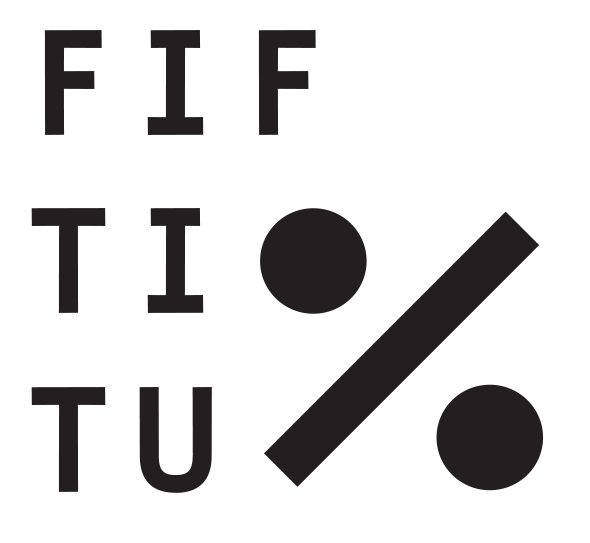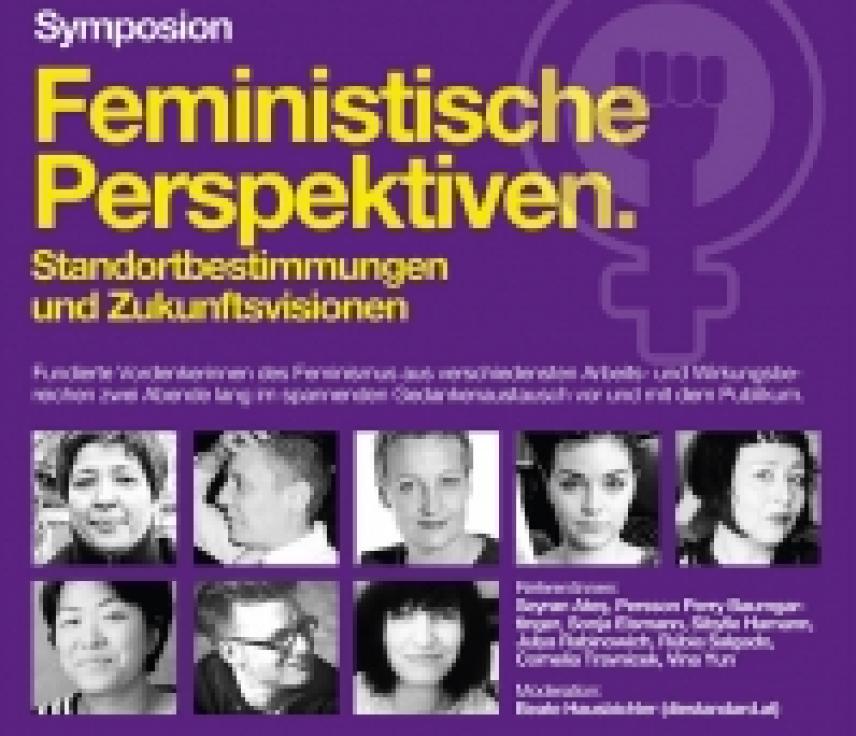Feminist perspectives
Positioning and visions for the future
Symposium | Thu. 16 + Fri. 17 January 2014
Recordings of the symposium on DORF TV
DORF TV conversation with Persson Perry Baumgartinger on Language. Power. Discrimination. Resistance.
DORF TV media talk with Sonja Eismann - editor-in-chief and co-founder of Missy Magazine (DE)
Photos Feminist Perspectives
A place of dialogue where no fixed views are occupied, but a place that is kept free for debate: The symposium "Feminist Perspectives" by Posthof and FIFTITU% taking place in January 2014 brings together current positions that make the diversity of feminist thinking (in the cultural field) visible and encourage people to go beyond the boundaries of their own thinking.
These are turbulent times for committed women. On the one hand, there is the threat of a general backlash; in several countries, achievements that have already been made are being reversed, for example in Spain, where one of the most liberal abortion laws in Europe is being repealed by the conservative Rajoy government. In Russia, an autocratic ruler is sending protesting young women to labor camps. And the much-cited Arab Spring is developing in a disappointing to worrying way from a female perspective.
At the same time, new forms of resistance are emerging: Femen activists are attracting attention with slogans on bare breasts; a comic figure called Burka Avenger is fighting in Pakistan with flying books and pens against reactionary Islamists who want to keep young girls away from educational institutions; a schoolgirl who was seriously injured by the Taliban gives a moving speech at the United Nations.
And in Austria? A man from Salzburg who raped a minor several times gets off with a 4-month ankle bracelet. The victim is advised to talk to the perpetrator.
What can current, politically thought-out feminist positions look like in light of all these developments? What strategies are emerging? In collaboration with fiftitu %, the Posthof attempts to explore these questions and invites well-founded feminist thought leaders from various fields of work and activity to exchange ideas and engage in exciting debates.
Speakers:
Sibylle Hamann (16.1.)
Julya Rabinowich (16.1.)
Sonja Eismann (16.1.)
Persson Perry Baumgartinger (17.1.)
Cornelia Travnicek (17.1.)
Seyran Ateş (17.1.)
Rúbia Salgado (17.1.)
Moderation:
Beate Hausbichler | diestandard.at
Concept & design:
Wilfried Steiner, Roswitha Kröll
Sincere thanks to
Mary Kreutzer & Thomas Schmidinger
Admission prices:
One-way tickets 16., 17.1: € 11/13/15
Two-day ticket: € 17/19
(num. seats in each case, start at 19:00)
A project by Posthof and FIFTITU% - Networking Center for Women in Art and Culture in Upper Austria in cooperation with the Upper Austrian Chamber of Labor
Women speakers day 1
Sibylle Hamann
Clean services. A report
They clean the toilet, look after the child and change grandma's nappies - we don't let anyone invade our tabooed private sphere as easily as our cleaning lady, babysitter or carer. Who are these "service providers" to whom we entrust our keys, where do they come from, how do they live? Illuminating an industry without which our society cannot exist. Sibylle Hamann looks behind closed doors, visits children who have been left behind and encounters a world full of lies and shame. In order to empathize even better, she started a self-experiment and went cleaning under a false identity.
Sibylle Hamann, born in Vienna in 1966, studied political science. Has worked as a traveling reporter since 1990 (Kurier, profil): Reports on the upheavals in the Soviet Union, the Caucasus, the Near and Middle East, the civil wars in Central Africa and Afghanistan. Longer stays in Japan and the USA, correspondent in New York. Since 2006 she has been living in Vienna again as a freelance journalist and author. Editor-in-chief of the "Liga. Zeitschrift für Menschenrechte", lecturer on the journalism course at the FH, columnist for the "Presse", regular author for the "Falter" and "Emma". Moderator and lecturer. Book publications: "Dilettanten unterwegs" (2007) about the work of foreign correspondents; "Weißbuch Frauen, Schwarzbuch Männer: Warum wir einen neuen Geschlechtervertrag brauchen" (2008) together with Eva Linsinger; "Saubere Dienste" about the world of cleaners, carers and babysitters (2013)
http://www.sibyllehamann.com/
Julya Rabinowich
Cavalier offense and object of use or dispossession. On the significance of the female body as an object of use and of victim-offender reversal based on the Salzburg shackle case, the Priklopil case and the Fritzl case.
The advice that the victim should talk to the perpetrator introduces the reinterpretation of a physical assault into a stupid misunderstanding, while the public's treatment of Natascha Kampusch paints another questionable picture of the so-called victim role.
Julya Rabinowich, born in St. Petersburg in 1970, has lived in Vienna since 1977, where she also studied. Author, painter and simultaneous interpreter. Her column "Geschüttelt, nicht gerührt" (Shaken, not stirred) appears weekly in the daily newspaper Der Standard. Her debut novel "Spaltkopf" (2008) won her the Rauris Literature Prize, among others. The English translation of the novel, published in February 2011, is also a highly acclaimed success (nominated for the International Impac Dublin Literary Award 2013). Plays and world premieres (among others): "Stück ohne Juden", Volkstheater (2010), "Auftauchen. Eine Bestandsaufnahme", Volkstheater (2010), "Porno", Rabenhof (2011). Most recently, "Herznovelle" (2011, nominated for the Prix du Livre Européen) and the novel "Die Erdfresserin" (2012) were published by Deuticke.
http://www.julya-rabinowich.com/
Sonja Eismann
Feminism as a renewal ideology of capitalism? On new mainstream articulations of "successful feminism" and the potential for resistance in this regard
In recent years, the promises of feminism with its slogans such as "Pro Choice" have been turned AGAINST women in an almost ominous way: Neoliberalism's ideology of feasibility and personal responsibility preaches indiscriminately that everyone is the architect of their own fortune - and those who do not succeed are not excluded by structures, but are themselves to blame. In times of post-Fordism, when one salary per couple/family is no longer enough anyway, the long-claimed economic independence of women is not a feminist achievement, but a bitter necessity. The overall picture of a successful lifestyle also includes physical attractiveness and fitness, which can be achieved through hard work on the self and is an unavoidable must, especially for women. Social participation is realized through consumerism instead of political debate, because where everyone supposedly has the same opportunities and hard work is all that matters, there is nothing to protest about. Needless to say, women of color, women from economically disadvantaged backgrounds, without academic education and without a Western background, do not appear in these empowerment scenarios at all or only as immature beings to be liberated
What can a feminist debate do to counter this version of "feminism as a capitalist ideology of renewal"? How is it possible not only to resist these appropriations, but to actively participate in their dismantling? How can these appropriations be made visible as such without denouncing the efforts of feminist struggles per se?
Sonja Eismann, born in Heidelberg in 1973, lives and works in Berlin. She studied comparative literature, English and French. Active as a journalist at the interface of feminism and pop culture since the late 1990s, she co-founded the magazine "nylon. KunstStoff zu Feminismus und Popkultur" and worked at the Cologne pop culture magazine Intro from 2002-2007. In 2008, she co-founded Missy Magazine, of which she is still co-publisher and editor-in-chief today. In texts, workshops, lectures and courses, she deals with current feminist and do-it-yourself discourses, the representation of gender in popular culture and concepts of the utopian in fashion.
missy-magazine.de
Speakers day 2
Persson Perry Baumgartinger
Language . Power . Discrimination . Resistance .
Language has to do with knowledge and power, it reflects realities and reinforces them at the same time - linguistic action supports a discriminatory world order. But communicating also means resistance. Language is constantly changing and this can be exploited. One of the most important issues for feminist movements and theories was the confrontation with sexist language. But do linguistic strategies of resistance (really) change social structures of oppression? Which language does justice to gender? Which norms are re-inscribed with queer-feminist language alternatives?
Persson Perry Baumgartinger, researcher, lecturer, trainer and coach. Studied applied linguistics and feminist discourse research. Currently a doctoral student at the University of Vienna and associated with the Research Training Group "Gender as a Category of Knowledge" at the Humboldt University of Berlin. Main research interests: Critical discourse and dispositive analysis, transgender studies, queer linguistics. Co-founder of the initiatives ][diskursiv and queeropedia. Collaborations with various institutes, offices and individual artists. Lectures, trainings & coachings on the topics of language, power & gender; non-discriminatory language; feminist-queer language alternatives; critical diversity.
http://homepage.univie.ac.at/perry.baumgartinger
Cornelia Travnicek
Cramped worlds: Corset Feminism. On the latest problems with the old concept of emancipation
We are everywhere at once and nowhere really. We have won and watch each other lose every day. Everything is so simple and turns out to be incredibly complicated. And Alice Schwarzer again and again. Of the new puritanism in the women's movement, of blind spots and open contradictions.
Cornelia Travnicek, born in 1987 in St. Pölten, studied sinology and computer science and works as a researcher at a center for virtual reality and visualization at Tech Gate Vienna. Pathologically addicted to the written word - according to her self-diagnosis. Would rather be a fixed star than a comet. Writes not too close to her own life and usually a long way beyond it. (C.T.). Her literary works have already won several awards, most recently an excerpt from "Junge Hunde" with the BKS Audience Award at the Days of German-Language Literature 2012, the novel "Chucks" (2012, DVA) with the Recognition Award for Literature of the Province of Lower Austria 2012 and the Kranichstein Literature Scholarship 2013.
http://www.corneliatravnicek.com/
Seyran Ateş
"When I think of feminism, I think of gender equality, rights and duties at eye level, education and voting rights for women, participation in all areas of society, politics and work. In other words, I think of the overthrow of international patriarchy. But what do we hear and see, not only in the Islamic world, when the word feminism is mentioned? Denigration and violence! While an incredibly strong group of women fight for more rights, participation and gender equality, the others "cover up" and join the fight against women who claim the public space for themselves.
How many steps have we already taken on the road to greater equality, how many steps are we currently taking backwards worldwide? Or does it just seem that way? Do we need to break new ground, take a closer look? As soon as I discover young women who confirm to me that things are progressing rather than regressing, the next report about sexual abuse and mass rape appears. I am plagued by the fact that even feminists contribute to the fact that women (especially in Islamic countries) remain exposed to their suffering because they preach political correctness and deny the violence caused by religion and tradition."
Seyran Ateş, born in Istanbul in 1963. The German author of Turkish-Kurdish origin is a lawyer in Berlin who mainly deals with criminal law and family law and has also been involved in German immigration policy. Seyran Ateş was a member of the German Islam Conference and took part in the German government's integration summit. In August 2006, she temporarily gave up her license to practise law due to violent attacks and threats by opponents in court and hostility from political associations. In October 2009, Ullstein Verlag announced that Ateş would withdraw completely from the public eye following new death threats and imminent danger to herself and her family. However, she has been speaking out again since summer 2011 and reopened her law firm in summer 2012.
http://de.wikipedia.org/wiki/Seyran_Ates
Rúbia Salgado
On the relationship between learning the hegemonic language German and a Western European impetus to liberate supposedly non-emancipated migrant women
Learning the hegemonic language German is considered to be of particular importance with regard to participation in social life and the shaping of a self-determined life in Austria. Migrant women would need German language skills in order to "go outside" or "be able to act outside". Going outside appears as leaving an imagined inside. An imagined interior of lack of independence. The outside is the public space with its squares, places of consumption and institutions, such as the school, the hospital, the doctor's surgery or cultural institutions: what they all have in common is that they presuppose a certain ability to act independently within their boundaries. This ability to act independently within this hegemonic outside is often denied to learning migrants, mainly because they would not or not sufficiently master the hegemonic language.
The (supposedly feminist and/or anti-racist) goal of empowering interaction in the public sphere coupled with the denial of the ability of migrant learners to move independently in the public sphere and engage in social interaction despite having little knowledge of the hegemonic language could rest on a "knowledge" of the necessity and correctness of a certain form of interaction in the public sphere in Western European societies. Especially when it comes to learning migrant women (women), standard narratives (Mohanty) about isolation and compartmentalization of migrant women through patriarchal violence should be taken into account.
In this sense, the goal of empowering migrants to leave an imagined inside, to enter a necessary outside and to act independently there, should be critically examined. One could ask whether this is a hidden impetus for liberation (Castro Varela/Dhawan). We could also examine the extent to which this goal is influenced or made possible by two standard narratives: the view of migrants (women) as victims of presumed patriarchal isolationist violence and the narrative of "migrant life" (not only referring to women), which would take place in isolation from a (supposedly homogeneous) majority society.
Rúbia Salgado, born in Brazil in 1964, works as an adult educator, cultural worker and author in self-organized contexts. Her work focuses on critical educational and cultural work in the migration society. She is currently working in research and development projects in the field of adult education as a pedagogical director and teacher (German as a second language, literacy, political education, cultural mediation). She is a co-founder and employee of the self-organization maiz, an independent association by and for migrant women with the aim of improving the living and working situation of migrant women in Austria and promoting their political and cultural participation as well as bringing about a change in unjust social conditions.
http://www.maiz.at/de/publikationen/texte-von-maiz


